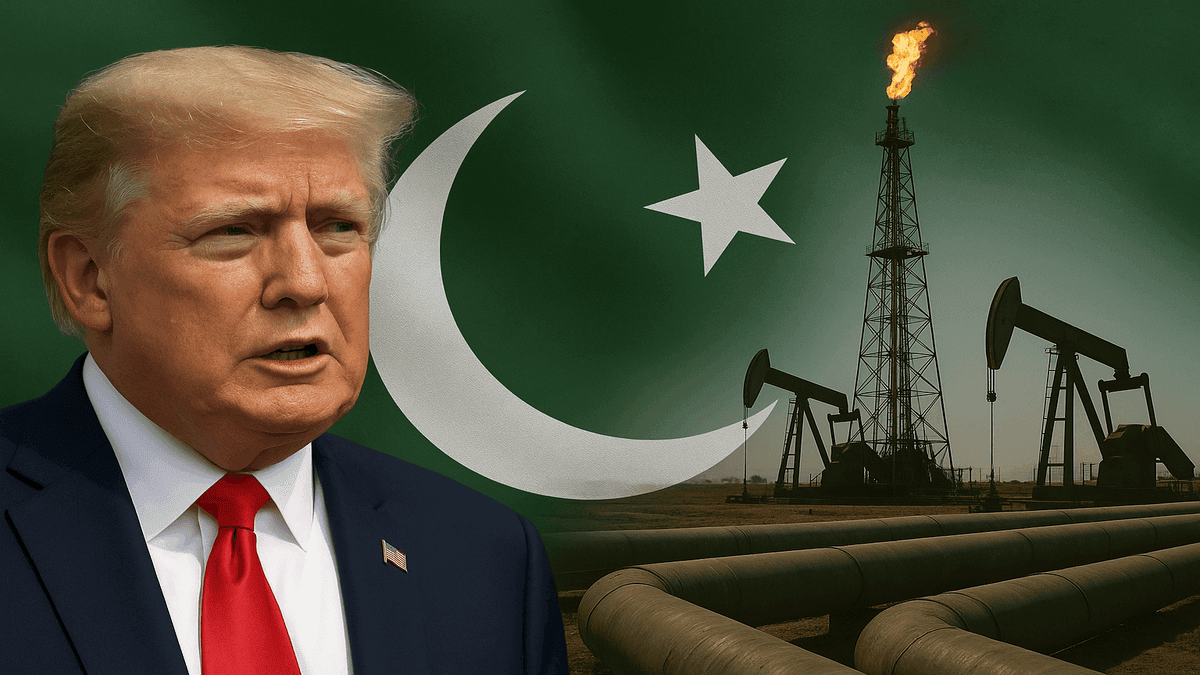
Washington – When U.S. President Donald Trump announced last week that a “deal” had been made to exploit Pakistan’s massive oil reserves, many in Pakistan were left baffled. The statement, made during a political rally, suggested that the South Asian nation possessed untapped petroleum wealth of global significance. However, official figures and industry data paint a very different picture of Pakistan’s oil reserves, raising questions about the source and intent behind Trump’s claim.
The Claim vs. The Facts
Trump’s remark “Pakistan has massive oil reserves, and we have a deal to tap them” implied a substantial energy partnership. Yet, Pakistan’s oil reserves are modest compared to the Middle East’s energy giants. According to the U.S. Energy Information Administration (EIA) and Pakistan Petroleum Limited (PPL), the country’s proven reserves stand at around 354 million barrels. In contrast, Saudi Arabia’s reserves exceed 260 billion barrels, and even smaller Gulf states like Kuwait have more than 100 billion barrels.
This stark disparity underscores why Trump’s comment puzzled not just ordinary citizens but also energy sector analysts. The numbers simply don’t align with the notion of “massive” reserves.
Pakistan’s Oil Production Reality
Pakistan produces roughly 80,000–90,000 barrels of crude oil per day, which meets only about 20% of its domestic demand. The rest is imported, mainly from the Middle East. The local oil sector faces challenges such as high exploration costs, limited technological capability, and unstable investment conditions.
Industry experts point out that while there is potential for increased exploration, the geological prospects for large scale oil discoveries remain limited. Most exploration in recent years has focused on natural gas rather than crude oil.
Possible Sources of Trump’s Information
Analysts suggest several possibilities for Trump’s claim:
1. Misinterpretation of Resource Potential – There is ongoing exploration in offshore areas near Karachi, particularly the Kekra-1 deep-sea project initiated in 2019. Some political rhetoric might have conflated these projects with large proven reserves.
2. Political Messaging – Trump has a history of making bold statements to emphasize U.S. influence abroad. By framing Pakistan’s oil reserves as “massive,” he might have been aiming to highlight the potential benefits of future U.S.-Pakistan cooperation.
3. Speculative Resource Estimates – While Pakistan does have unexplored basins, speculative resources cannot be equated to proven reserves without geological confirmation.
Suggested Read: Is the US Trying to Contain India’s Rise Like It Did with Japan? A Geopolitical Warning from China
The Energy Policy Context
Pakistan’s energy mix is heavily skewed towards imported fossil fuels, creating trade imbalances and foreign exchange pressure. The government has been trying to attract foreign investment to boost exploration and reduce dependence on imports. However, political instability, security concerns, and policy inconsistency often deter long term commitments.
If Trump’s claim were grounded in genuine new discoveries, it would mark a major shift in Pakistan’s oil reserves profile. Yet, no such announcement has come from Pakistan’s Ministry of Energy, nor from international oil companies operating in the country.
Why Such Claims Matter
Statements like Trump’s can influence financial markets, diplomatic relations, and public expectations. For Pakistan, inflated claims about oil reserves can create unrealistic economic optimism, potentially leading to policy missteps or speculative investment surges.
From an analytical standpoint, there is also the question of geopolitical leverage. Oil wealth can dramatically alter a nation’s strategic importance. By suggesting Pakistan holds “massive” reserves, Trump might have been hinting at a broader geopolitical narrative positioning Pakistan as a future energy player.
Expert Opinions
Energy analyst Dr. Farah Nadeem notes:
“We have to differentiate between resource speculation and proven reserves. Pakistan’s oil reserves, in technical terms, are modest. Any major discovery would be officially verified and reported in both domestic and international energy databases.”
Economist Syed Raza adds:
“Such statements, when not based on verified data, risk distorting public understanding and policy priorities. Pakistan needs realistic energy planning, not exaggerated expectations.”
Conclusion
Donald Trump’s declaration about Pakistan’s massive oil reserves stands in sharp contrast to the documented reality. While Pakistan does have unexplored potential, its current proven reserves are relatively small. The claim highlights how political rhetoric can sometimes overshadow verified facts and why critical analysis is essential before accepting bold statements about strategic resources.
Stay Connected with The News Drill for more analytical news and fact checked reports on global politics and energy policy.
Source: The Washington Post Report
















